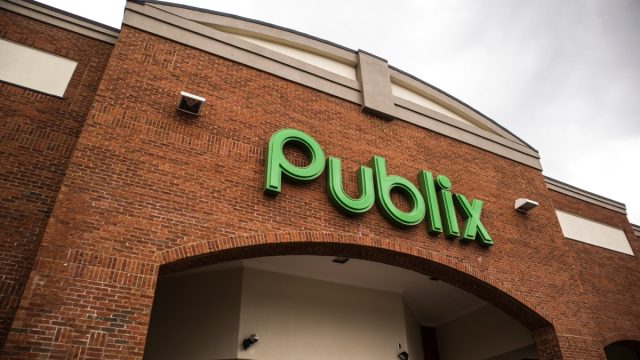Fish Sold at Publix Recalled Over Potential Listeria, FDA Says in New Warning

From fruit cups to salami, a number of products have been recalled recently over potential Listeria contamination. But now a similar recall has reached the preferred supermarket of many people in the southeast: Publix. This Florida-based grocery chain has found itself at the center of a problem linked to Listeria concerns.
Read on to find out more about the new recall, which affects a certain type of popular seafood sold at Publix.
READ THIS NEXT: Listeria Outbreak Has Hit 10 States—These Are the Foods Most Likely to Cause Listeriosis.
The FDA is warning about a new fish recall.

In a March 31 announcement, the U.S. Food and Drug Administration (FDA) has just alerted consumers about a new food concern. The agency confirmed that Seven Seas International USA, LLC. is voluntarily recalling its Biltmore Smoked Wild Sockeye Salmon from the production lot R4058.
According to the alert, the Florida-based manufacturer actually initiated its recall back on March 14—so only packages of the salmon sold prior to this date with the lot code R4058 are affected. The FDA urges customers to check for the code, which can be found on the product’s clear plastic film, noting that “no other production codes are affected by this recall.”
This salmon was only sold at Publix stores.

The recalled Biltmore Smoked Sockeye Salmon products were “sold at Publix Supermarkets only,” according to the FDA alert. But as of April 3, the Florida-based grocer does not have the salmon recall listed on its official website. Best Life has reached out to Publix about the new recall, and we will update this story with their response.
“We take our responsibility to for our customers’ safety very seriously. We vigilantly monitor regulatory agencies, so we’re among the first to know when a product recall or food safety warning is issued,” Publix states on its website. “If a recall or warning occurs, we immediately alert store locations to remove the product from the shelves (if sold there).”
RELATED: For more up-to-date information, sign up for our daily newsletter.
The FDA says the salmon may be contaminated with Listeria.

The FDA said the Biltmore Smoked Sockeye Salmon was recalled because of a “possible health risk.” As explained in the alert, routine regulatory testing conducted by the Florida Department of Agriculture and Consumer Services found that Listeria monocytogenes may be present in some of the salmon products in the affected production lot. Listeriosis is a “serious and sometimes fatal” infection that people may develop after eating food contaminated by this bacteria, according to the FDA.
Listeriosis can cause a variety of symptoms that may last from days to several weeks, depending on the severity of your illness. This could include anything from fever, muscle aches, nausea, vomiting, and diarrhea for mild infections to headache, stiff neck, confusion, loss of balance, and convulsions if a more severe form of the disease develops. “People infected with Listeria monocytogenes may start to see symptoms in a few hours or as long as two to three days after eating contaminated food,” the FDA says. “More severe forms of listeriosis may take anywhere from three days to three months to develop.”
Consumers should return any recalled products.

There were 295 cases of the salmon in the recalled production lot, so many customers could be affected. You’ll want to check any of your Biltmore Smoked Sockeye Salmon products to make sure you don’t accidentally eat anything included in the recall. “Consumers who have purchased this product with this lot code are being advised not to consume it and return it to the store where it was originally purchased for a full refund,” the FDA stated in its alert.
Eating food contaminated with Listeria can be deadly for some people. “For the very young, the elderly, and the immune-compromised listeriosis can result in death,” the FDA warns. “Due to the range in severity of illness, people should consult their health care provider if they suspect that they have developed symptoms that resemble a Listeria infection.”
This disease can also be “particularly dangerous” for pregnant women and their newborn babies, according to the agency. “Babies born with a listeriosis infection may develop severe health complications that require immediate medical attention, lead to lifelong health problems, or result in death,” the FDA adds. “Women who suspect they have symptoms of listeriosis (muscles aches, nausea, stiffness in neck, headaches, etc.) should seek medical care immediately and tell their health provider what they ate.”